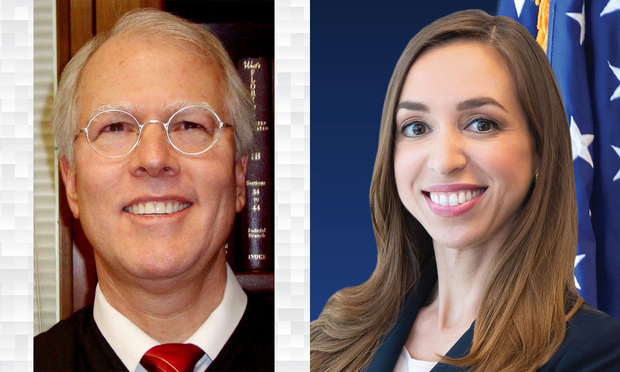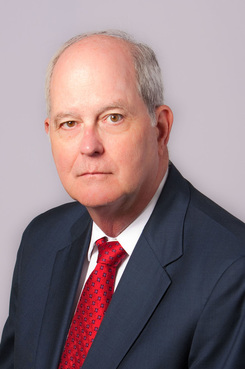No Rehearing for Cole Scott Clients in Cases Requesting Judge Miller's Recusal
Critics called it “judge shopping," but Florida's largest insurance defense firm, Cole, Scott & Kissane, said it was "the clients' decision."
August 31, 2018 at 02:21 PM
5 minute read
 Miami-Dade Circuit Judge David C. Miller and Cole, Scott & Kissane partner Elisabeth Espinosa. Courtesy photos
Miami-Dade Circuit Judge David C. Miller and Cole, Scott & Kissane partner Elisabeth Espinosa. Courtesy photos
The Third District Court of Appeal issued three rulings denying three separate motions aimed at removing Miami-Dade Circuit Judge David C. Miller from a host of cases involving clients of Florida's biggest insurance defense firm, Cole Scott & Kissane.
The appellate decisions affirmed Miller's position that there was no legitimate basis for recusal.
The saga began in April, when one of Cole Scott's lawyers, Elisabeth Espinosa, chose to run for judicial office in the 2018 elections. If elected, Espinosa would have replaced Miller on the bench.
But Espinosa ultimately fell short In the Aug. 28 primary, with roughly 47 percent of the vote.
During her election bid, though, Cole Scott filed 33 motions on clients' behalf to disqualify Miller and five sua sponte recusal requests.
Critics called it “judge shopping” and plaintiffs lawyers expressed concern about unnecessary delays in their cases if Cole Scott's clients were to get their way.

Related story: Lawyers Debate Cole Scott's Move to Throw Judge David Miller Off Cases
One plaintiffs attorney, Victor M. Diaz Jr. represents Susan Chapman in a case against Elite Parking LLC.
According to Diaz, the motions “created a distraction” and delayed his core objective, which was “to get our client, who was grievously injured after a valet attendant backed into her while parking a car, just compensation for her injuries.”
Diaz, who's practiced law in Miami-Dade County for 33 years, calls the action “unprecedented.”
 Richard Cole, Managing Partner of Cole, Scott & Kissane in Miami. Courtesy photo
Richard Cole, Managing Partner of Cole, Scott & Kissane in Miami. Courtesy photoBut according to Richard Cole, managing partner of Cole, Scott & Kissane in Miami, it wasn't the firm's decision.
“It is not Cole Scott. It is the clients of the firm who made the decision,” Cole said. “When we had a partner decide that she wanted to run, we informed the clients. Many of the clients said that they felt that they would not get fair treatment in front of a judge where a Cole Scott laywer was running against the judge. They filed affidavits to that effect. We, as their lawyer, then filed the motion to disqualify him only on those cases where the clients made such a request.”
Not every Cole Scott client saw Espinosa's bid as a problem.
“Many said, 'We would like to move to disqualify.' Some said 'No, we're comfortable with it being in front of Judge Miller. We do not want you to file such a motion,' and we didn't,” Cole said.
At that point, according to Cole, many clients said they wanted to appeal the ruling, but some decided not to take it any further.
The 28 motions that were appealed were consolidated into one case and later denied by a judicial panel.

Related story: Cole Scott Loses Appeal to Remove Judge in 27 Cases
The same panel that heard the original appeal, Third District Court of Appeal Judges Vance E. Salter, Kevin Emas and Norma Lindsey, signed the Aug. 29 ruling denying rehearing.
In addition, eight out of 10 judges denied a request for a rehearing en banc, which would have had in the entire appellate court weigh in on the matter. It also denied a request for the matter to be labelled an issue of exceptional importance and potentially heard by the Florida Supreme Court, though Judges Barbara Lagoa and Robert J. Luck said they would have granted the motion for rehearing en banc.
Miller isn't sure what to make of the whole thing.
“I have no idea whose thoughts came first or last, but my opponent was not in any of the cases that were against me,” Miller said. “There are a million theories and everybody's got opinions, but I have no way of knowing what happened,” Miller said.
Diaz said he looks forward to questioning the defendants who signed the motion for recusal in his case.
“Given that one of them, in my case in particular, is a valet attendant, I look forward to finding out how much information they were provided before they signed that document and whether they were given other alternatives, like the opportunity to switch counsel,” Diaz said.
Diaz calls the ruling a “wake-up call” for the legal community and hopes it will take heed of what he feels is “a dangerous precedent” and “a threat to the independence of the judiciary.”
“The idea that a judge could be removed by a powerful law firm from hearing all of the cases pending before that particular judge, because one of many lawyers in their law firm chose to run for judicial law office, creates the potential for malicious abuse of the process by someone with ill motives. I think that every judge and every lawyer should be wary to make sure that this doesn't become a pattern that repeats itself, perhaps with less than benign motives,” Diaz said.
With the election behind him, Miller said he hopes to focus on providing “as much access to the courts as possible.”
“I think it was a case of first impressions, so that made it interesting from a legal perspective,” Miller said. “But other than that it was just another case. Each judge has now more than 2,000 cases, so we don't get consumed with this kind of thing. We have a lot of work to do.”
This content has been archived. It is available through our partners, LexisNexis® and Bloomberg Law.
To view this content, please continue to their sites.
Not a Lexis Subscriber?
Subscribe Now
Not a Bloomberg Law Subscriber?
Subscribe Now
NOT FOR REPRINT
© 2025 ALM Global, LLC, All Rights Reserved. Request academic re-use from www.copyright.com. All other uses, submit a request to [email protected]. For more information visit Asset & Logo Licensing.
You Might Like
View All
Tragedy on I-95: Florida Lawsuit Against Horizon Freight System Could Set New Precedent in Crash Cases
2 minute read
'You Lied to the Jury': Veteran Awarded $5 Million in Defamation Case Against CNN
4 minute read
Vedder Price Shareholder Javier Lopez Appointed to Miami Planning, Zoning & Appeals Board
2 minute readTrending Stories
Who Got The Work
J. Brugh Lower of Gibbons has entered an appearance for industrial equipment supplier Devco Corporation in a pending trademark infringement lawsuit. The suit, accusing the defendant of selling knock-off Graco products, was filed Dec. 18 in New Jersey District Court by Rivkin Radler on behalf of Graco Inc. and Graco Minnesota. The case, assigned to U.S. District Judge Zahid N. Quraishi, is 3:24-cv-11294, Graco Inc. et al v. Devco Corporation.
Who Got The Work
Rebecca Maller-Stein and Kent A. Yalowitz of Arnold & Porter Kaye Scholer have entered their appearances for Hanaco Venture Capital and its executives, Lior Prosor and David Frankel, in a pending securities lawsuit. The action, filed on Dec. 24 in New York Southern District Court by Zell, Aron & Co. on behalf of Goldeneye Advisors, accuses the defendants of negligently and fraudulently managing the plaintiff's $1 million investment. The case, assigned to U.S. District Judge Vernon S. Broderick, is 1:24-cv-09918, Goldeneye Advisors, LLC v. Hanaco Venture Capital, Ltd. et al.
Who Got The Work
Attorneys from A&O Shearman has stepped in as defense counsel for Toronto-Dominion Bank and other defendants in a pending securities class action. The suit, filed Dec. 11 in New York Southern District Court by Bleichmar Fonti & Auld, accuses the defendants of concealing the bank's 'pervasive' deficiencies in regards to its compliance with the Bank Secrecy Act and the quality of its anti-money laundering controls. The case, assigned to U.S. District Judge Arun Subramanian, is 1:24-cv-09445, Gonzalez v. The Toronto-Dominion Bank et al.
Who Got The Work
Crown Castle International, a Pennsylvania company providing shared communications infrastructure, has turned to Luke D. Wolf of Gordon Rees Scully Mansukhani to fend off a pending breach-of-contract lawsuit. The court action, filed Nov. 25 in Michigan Eastern District Court by Hooper Hathaway PC on behalf of The Town Residences LLC, accuses Crown Castle of failing to transfer approximately $30,000 in utility payments from T-Mobile in breach of a roof-top lease and assignment agreement. The case, assigned to U.S. District Judge Susan K. Declercq, is 2:24-cv-13131, The Town Residences LLC v. T-Mobile US, Inc. et al.
Who Got The Work
Wilfred P. Coronato and Daniel M. Schwartz of McCarter & English have stepped in as defense counsel to Electrolux Home Products Inc. in a pending product liability lawsuit. The court action, filed Nov. 26 in New York Eastern District Court by Poulos Lopiccolo PC and Nagel Rice LLP on behalf of David Stern, alleges that the defendant's refrigerators’ drawers and shelving repeatedly break and fall apart within months after purchase. The case, assigned to U.S. District Judge Joan M. Azrack, is 2:24-cv-08204, Stern v. Electrolux Home Products, Inc.
Featured Firms
Law Offices of Gary Martin Hays & Associates, P.C.
(470) 294-1674
Law Offices of Mark E. Salomone
(857) 444-6468
Smith & Hassler
(713) 739-1250







